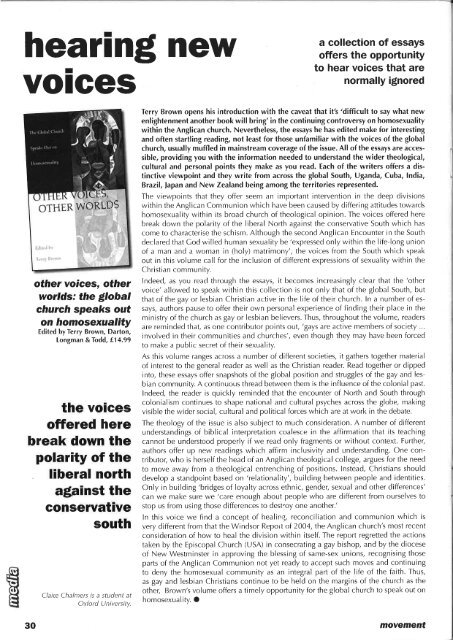Movement 124
You also want an ePaper? Increase the reach of your titles
YUMPU automatically turns print PDFs into web optimized ePapers that Google loves.
hearin$ new<br />
volGes<br />
a collection of essays<br />
offers the opportunity<br />
to hear voices that are<br />
normally ignored<br />
s<br />
Ulrl<br />
hl<br />
\a<br />
l','|'<br />
OTHER WORLDS<br />
klrttJ t'r<br />
lirrt llr,trvn<br />
)<br />
../<br />
/\.<br />
I '0<br />
t, .l<br />
I<br />
other voices, other<br />
worlds: the SIobaI<br />
church speaks out<br />
on homosexuatff<br />
Edited by Terry Brown, Darton,<br />
Longman & Todd, 814.99<br />
the voices<br />
offered here<br />
break down the<br />
polarity of the<br />
liberal north<br />
atBinst the<br />
conservative<br />
south<br />
Claire Chalnters is a student at<br />
Oxford University.<br />
Terry Brown opens his introduction with the caveat that it's'difficult to say what new<br />
enlightenment another book will bring' in the continuing controversy on homosexuality<br />
within the Anglican church. Nevertheless, the essays he has edited make for interesting<br />
and often startling reading, not least for those unfamiliar with the voices of the global<br />
church, usually muffled in mainstream coverage of the issue. All of the essays are accessible,<br />
providing you with the information needed to understand the wider theological,<br />
cultural and personal points they make as you read. Each of the writers offers a distinctive<br />
viewpoint and they write from across the global South, Uganda, Cuba, lndia,<br />
Brazil, Japan and New Zealand being among the territories represented.<br />
The viewpoints that they offer seem an important intervention in the deep divisions<br />
within the Anglican Communion which have been caused by differing attitudes towards<br />
homosexuality within its broad church of theological opinion. The voices offered here<br />
break down the polarity of the liberal North against the conservative South which has<br />
come to characterise the schism. Although the second Anglican Encounter in the South<br />
declared that Cod willed human sexuality be'expressed only within the life-long union<br />
of a man and a woman in (holy) matrimony', the voices from the South which speak<br />
out in this volume call for the inclusion of different expressions of sexuality within the<br />
Christian community.<br />
lndeed, as you read through the essays, it becomes increasingly clear that the 'other<br />
voice'allowed to speak within this collection is not only that of the global South, but<br />
that of the gay or lesbian Christian active in the life of their church. ln a nunrber of essays,<br />
authors pause to offer their own personal experience of finding their place in the<br />
ministry of the church as gay or lesbian believers. Thus, throughout the volume, readers<br />
are reminded that, as one contributor points out, 'gays are active members of society ...<br />
involved in their communities and churches', even though they may have been forced<br />
to make a public secret of their sexuality.<br />
As this volume ranges across a number of different societies, it gathers together nraterial<br />
of interest to the general reader as well as the Christian reader. Read together or dipped<br />
into, these essays offer snapshots of the global position and struggles of the gay and lesbian<br />
community. A continuous thread between them is the influence of the colonial past.<br />
lndeed, the reader is quickly reminded that the encounter of North and South through<br />
colonialism continues to shape national and cultural psyches across the globe, making<br />
visible the wider social, cultural and political forces which are at work in the debate.<br />
The theology of the issue is also subject to much consideration. A number of different<br />
understandings of biblical interpretation coalesce in the affirmation that its teaching<br />
cannot be understood properly if we read only fragments or without context. Further,<br />
authors offer up new readings which affirm inclusivity and understanding. One contributor,<br />
who is herself the head of an Anglican theological college, argues forthe need<br />
to move away from a theological entrenching of positions. lnstead, Christians should<br />
develop a standpoint based on'relationality', building between people and identities.<br />
Only in building'bridges of loyalty across ethnic, gender, sexual and other differences'<br />
can we make sure we 'care enough about people who are different from ourselves to<br />
stop us from using those differences to dest'oy one another.'<br />
ln this voice we find a concept of healing, reconciliation and communion which is<br />
very different from that the Windsor Report of 2004, the Anglican church's most recent<br />
consideration of how to heal the division within itself. The report regretted the actions<br />
taken by the Episcopal Church (USA) in consecrating a gay bishop, and by the diocese<br />
of New Westminster in approving the blessing of same-sex unions, recognising those<br />
parts of the Anglican Communion not yet ready to accept such moves and continuing<br />
to deny the homosexual community as an integral part of the life of the faith. Thus,<br />
as gay and lesbian Christians continue to be held on the margins of the church as the<br />
other, Brown's volume offers a timely opportunity for the global church to speak out on<br />
homosexuality. O<br />
30 movement

















